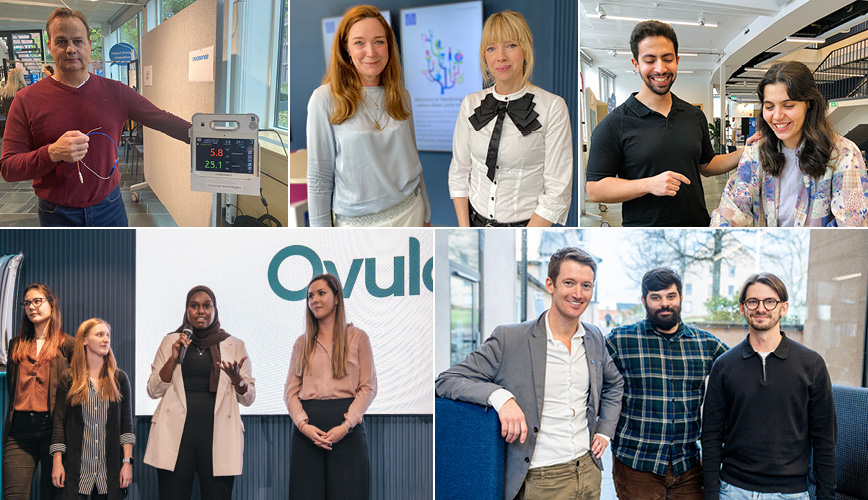Ten health innovations from KTH

Every year, researchers and students at KTH develop innovative solutions to improve human health. Here are 10 health innovations from KTH, from hormone-free birth control to AI solutions for mental health.
Blood samples at home
The researchers behind Capitainer have developed sampling cards that allows patients to take their own blood samples. The patient takes a simple finger prick and then squeezes a drop of blood which is sucked into a microchannel on the sampling card. The microchannel makes it possible to delineate a precise amount of blood that is captured. The patient then places the sampling card in an envelope and sends it to the laboratory or health center.
Hormone-free contraceptives
Cirqle is developing a novel approach to birth control, based on research from KTH. By reinforcing the natural cervical mucus barrier they aim to provide effective birth control on demand without any hormones.
Speech therapy for all
Dialog Therapy aims to make speech therapy available for everyone who needs it. Their platform is specifically designed for speech therapists and people living with aphasia. With Dialog, speech therapists can provide language exercises that their patients can do anywhere and anytime. Founded by students at KTH.
Quicker development time for new pharmaceuticals
Magnephy aims to improve the lives of patients suffering from kidney disease. Based on nearly 10 years of research, Magnephy combines nanoscale 3D-microscopy and AI-analysis to evaluate the tissue effect of drug candidates. Their solution that could shorten the development time for new pharmaceuticals. Based on research from KTH.
Pain-free drug delivery
Morningstar Therapeutics has developed microparticles that when added to creams make the delivery of pharmaceuticals and skincare much more efficient. The particles can be added to any cream and gently create micropores in the top layer of your skin, which allows all ingredients to be absorbed, without any discomfort. Potential candidates include skin rejuvenation and autoimmune disease treatment. Based on research from KTH.
Morningstar Therapeutics on LinkedIn
Better odds for premature babies
Premature babies need advanced intensive care and close monitoring after birth. One problem is that babies who receive too much or too little oxygen can develop serious complications. Neosense Technologies has developed a system that continuously measures the oxygen tension (pO2) in the blood. Tests have shown that the system can reduce morbidity and increase survival rates for critically ill premature babies. Based on research from KTH.
Support for women with PCOS
One in five women suffer from PCOS, polycystic ovarian syndrome, with symptoms such as irregular periods, body hair, weight gain and depression. Ovulai is developing an app where women with PCOS can receive digital guidance based on cognitive behavioral therapy. Founded by students at KTH.
AI-based mental health coach
Want to help your employees improve their mental health? Pokamind develops a video journaling platform to provide a safe space for expression and offers AI-based personalized advice for improved mental well-being. They also use aggregated insights to cultivate a supportive and understanding work culture.
Better DNA analysis
Single Technologies has developed a technology that can analyze 100 times more DNA at a price 100 times lower than the competition. Sequencing is a cog in a chain that starts with a blood or tissue sample from a patient and ends with information that can give doctors crucial information on everything from genetic diseases in a fetus to very early detection of cancer. Based on research from KTH.
Fewer interrupted infusions
Every year, 16 billion intravenous drips are administered. Of these, 10% fail because the IV catheter gets dislodged from the patient's vein during the infusion. Tada Group develops ReLink, a weak link concept to reduce IV catheter dislodgement. ReLink has self-sealable valves to prevent spill of medicine and blood, keeping patients and nurses safe. The technology, which reduces catheter dislodgements by 73%, is now close to FDA registration.

